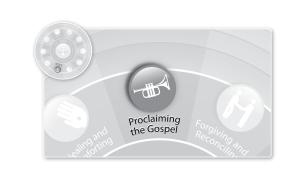 Post by Pastor Tim – Many families have the “crazy old aunt” that everyone loves but that also greatly embarrasses everyone. Our family had one, and our family gatherings would have been quite boring without her. Even though we truly loved her, the things she said always made us squirm in our seats a little bit.
Post by Pastor Tim – Many families have the “crazy old aunt” that everyone loves but that also greatly embarrasses everyone. Our family had one, and our family gatherings would have been quite boring without her. Even though we truly loved her, the things she said always made us squirm in our seats a little bit.
Unfortunately, this is also the way evangelicals often view the church fathers and church history. We pay quite a bit of “lip service” to the early church found in the New Testament, but we are quite embarrassed about the 1500 years that followed. In our minds, Martin Luther bravely declared that the Bible is the only thing that matters, and thus we can forget about (and thankfully so) what Origen, Tertullian and others spoke about so long ago.
I became aware of this even more deeply a few days ago when I decided to look for some good church history books in my local Christian bookstore. I filtered through shelves and shelves of Christian Living, Spirit-Filled, and Fiction books, but there was no section dedicated to church history. Ultimately, I found one book on Church History tucked away on a bottom shelf – sort of like the lovable, crazy old aunt.
This month our church has been studying how to proclaim the gospel, and I’ve been confronted with the fact that our evangelical gospel proclamations are a far cry from what we find in church history and even in the Scriptures themselves.
One of the clearest gospel proclamations in the Scriptures comes from 1 Corinthians 15:1-8. Notice that it doesn’t have the gospel elements that we consider so important today, namely . . .
• If you were to die today, where would you go, heaven or hell?
• Do you have a void in your heart that you need filled?
• Pray this simple prayer and you will be saved.
• Do you feel the goosebumps? That’s how you know you are saved.
Maybe these questions are overdone just a touch (and maybe not), but you get my point: We have particular emphases in our modern day gospel proclamations which haven’t been so evident in times past. C.S. Lewis got to the heart of this issue when he said,
Every age has its own outlook. It is specially good at seeing certain truths and specially liable to make certain mistakes. We all, therefore, need the books that will correct the characteristic mistakes of our own period. And that means the old books. All contemporary writers share to some extent the contemporary outlook – even those, like myself, who seem most opposed to it (Intro. to Athanasius’ on the Incarnation).
In other words, we shouldn’t interpret Scripture on a 21st century island. The councils, the debates and the commentaries of early Christianity should shape and inform our thoughts today!
Where should we start? Although nothing can replace reading the actual words of the church fathers, try starting with an introduction to church history, such as Justo Gonzales’ The Story of Christianity. But if you want a taste of some of the richness and depth found in the church fathers, here is a sample of what some of the church fathers said in relation to key scriptures concerning the gospel:
Chrysostom (347 – 407 AD) – But first it is worth while to hear what those who are infected with the Manichaean doctrines say here, who are both enemies to the truth and war against their own salvation. What then do these allege? By death here, they say, Paul means nothing else than our being in sin; and by resurrection, our being delivered from our sins. Do you see how nothing is weaker than error . . . Neither was he content with this, but added, according to the Scriptures: hereby both again making his argument credible, and intimating what kind of death he was speaking of: since it is the death of the body which the Scriptures everywhere proclaim. – Chrysostom, Homily 38 on First Corinthians
Jerome (342 – 420 AD) – We are saved by grace rather than works, for we can give God nothing in return for what he has bestowed on us.” – Jerome, Epistle to the Ephesians, 1.2.1.
Cyril of Alexandria (376 – 444 AD) – Let us glorify therefore Him Who being God the Word became man for our sakes: Who suffered willingly in the flesh, and arose from the dead, and abolished corruption: Who was taken up, and hereafter shall come with great glory to judge the living and the dead, and to give to every one according to his deeds: by Whom and with Whom to God the Father be glory and power with the Spirit for ever and ever. Amen.- Cyril, Commentary on Luke (Luke 24:45)










